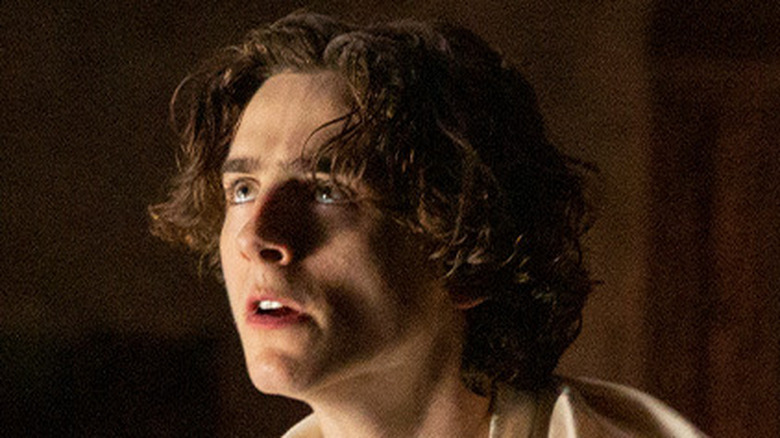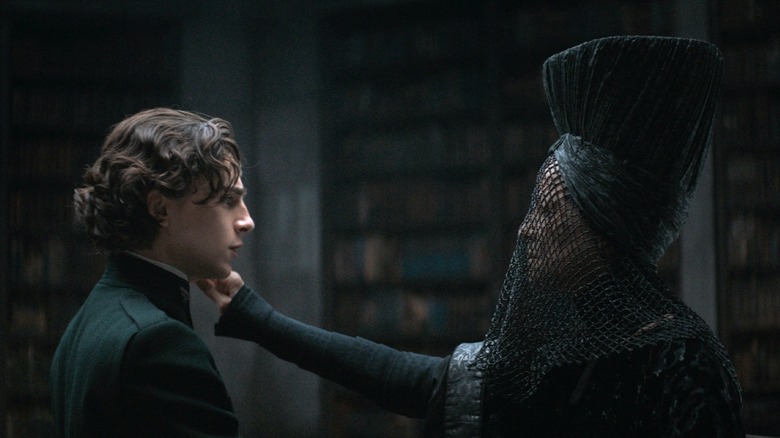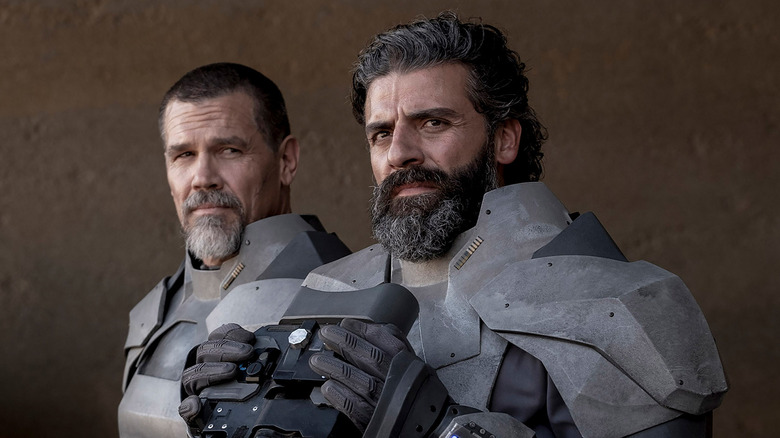Dune Review: To Be Continued
In 2016, when discussing David Lynch's 1984 adaptation of Frank Herbert's "Dune," in which she played Princess Irulan, actor Virginia Madsen said she thought the filmmakers were out to make "Star Wars for adults." Two years later, when he was first announced to adapt the novel anew, director Denis Villeneuve said the same thing. A full year after it was intended to hit multiplexes, Villeneuve's attempt to bring the storied novel to life will arrive in theaters simultaneously with its home release on HBO Max, a pandemic content strategy the director has been vocal in criticizing.
Under normal circumstances, wondering whether or not "Dune" will be a success at the box office would be an irrelevant question in reviewing the film's quality, but given the strange nature of this adaptation, it's unfortunately a very important topic. In trying to unpack the dense and layered 412-page novel, Villeneuve and his collaborators, screenwriters Eric Roth and Jon Spaihts, cleaved the book in two, with this film covering (roughly) the first half of the book. But because the studio was leery of committing to filming both halves before releasing the first, we won't know if the rest of the book will be adapted until after more number-crunching post-opening.
That means "Dune" ends on a cliffhanger and arrives missing significant chunks of its source material. (Princess Irulan, for instance, is never even introduced.)
Villeneueve's "Dune" is a stunning achievement in terms of awe, in terms of spectacle, and in its standing as one of the few new films that can genuinely lay claim to needing to be seen on as big a screen possible. But what it peacocks in visual splendor it lacks in depth in a way that feels hard to excuse, especially for a film with a two-and-a-half hour runtime.
Ultimately, "Dune" is ambitious to a fault, for what use does the marketplace of ideas have in a "Star Wars for adults" when the vast majority of adults these days seem to prefer the comforting, weaponized nostalgia of endless "Star Wars" ephemera?
The sleeper has awakened
For the uninitiated, "Dune" is a sci-fi epic set in a far-flung future, exploring a cosmic feudal society and the desert planet of Arrakis alluded to in the title that this society circulates around. Arrakis is an unforgiving terrain where "spice," a drug essential to interstellar travel, is harvested; whoever controls the spice controls the universe. The film begins as House Harkonnen (led by Stellan Skarsgard's Baron) is commanded by The Emperor to cede control of Arrakis to House Atreides (led by Oscar Isaac's Duke Leto), prompting the entire Atreides clan, including Leto's son Paul (Timothée Chalamet), to move from their home world of Caladan to this dangerous new planet.
There, they find themselves the center of an elaborate trap, with threats on all sides from the Harkonnens who want their cash cow back, forces within the Emperor's circle working against them, the Bene Gesserit's centuries long machinations coming to the fore and the Fremen, Arrakis natives tired of seeing new oppressors come and go. Also, Paul might be some kind of messiah. It's ... a lot.
What follows is an intricate web of political intrigue, dense mythology requiring artful exposition dumps, and a story that in some ways feels familiar even to newcomers. The novel, from 1965, was massively influential on mainstream science fiction in the ensuing years, so even outside of the 1984 film, "Dune" has thoroughly permeated the pop cultural consciousness. That means this is a film that comes with a heavy burden of needing to please ardent fans of Herbert's work and those otherwise unfamiliar with the source material. Villeneuve struggled to find this balance but didn't come to this battle unarmed.
"Dune" has assembled one of the most stacked and pedigreed casts in recent memory, including Zendaya, (Chani, a Fremen woman featuring heavily in Paul's prophetic dreams), Rebecca Ferguson (Paul's Mother Lady Jessica, a Bene Gesserit concubine), Jason Momoa (charismatic swordmaster Duncan Idaho), Josh Brolin (weapons master Gurney Halleck), Dave Bautista (Glossu Raban, Baron Harkonnen's bloodthirsty nephew) and Javier Bardem (Stilgar, a Fremen tribe leader). Coupled with Greig Fraser's striking cinematography and Hans Zimmer's thunderous, oppressive score, "Dune" is doubtless one of the most visually appealing and aurally sumptuous viewing experiences to come out of Hollywood since Villeneuve's last megabudgeted sci-fi epic "Blade Runner: 2049."
While that film was certainly more colorful, more zeitgeist-y, and tethered to a classic in its own right, "Dune" is better paced, more sharply written, and bears the mark of a filmmaker who has learned from his last tentpole effort, having grown as a storyteller for his trouble. On a surface level, "Dune" works remarkably well. The locales are dazzling and well realized. The texture in the world-building is impressive. It looks, feels, and sounds astonishing. But digging deeper reveals some drawbacks.
Having a veteran scribe like Eric Roth bringing his pen to the table certainly helps to distill the complex web of the film's plot into something somewhat digestible, but audiences will have a split reaction to the narrative. Viewers who have never read the books before will likely be enveloped by the richness in the visual storytelling, too hypnotized by the presentation and engrossed by its depiction of this world to want for more in the way of characterization. People more familiar with the story might be too frustrated by how much is left aside or abstracted to the point of nothingness to care how pretty the pictures are or how much collective gravitas the cast has amassed. It is easier to be pleased with what is presented when unaware of what is missing.
This split runs through every aspect of the film. Chalamet's central performance is captivating, to be sure, but so much of his character's interiority is lost through the way his story is told. There is so much to keep track of, regarding motivations, circumstance and positioning, that paying attention to the galactic politics and its ensemble cast will be enough work for a viewer whose concentration will be repeatedly and abruptly interrupted by Zimmer's cudgel of a score. So while it's impressive to see how good Villeneuve has gotten at grafting his arthouse sensibilities to the multiplex, it's still a little sad how much depth is lost in translation. Great if you just like seeing a gorgeous space opera writ as large as financially possible, but less so if you yearn for more from your science fiction.
And that's not even getting into how unsatisfying the film's sudden conclusion is.
Star Wars for adults or Star Wars for cinephiles?
The last notable time a beloved filmmaker worked this hard to spend more than $100 million in studio money on making a franchise film "for adults" was in 2011, when David Fincher thought "The Girl with the Dragon Tattoo" could be an antidote to a direction the industry has veered even further into. But he was wrong. The era of star-driven, not IP-driven, major motion pictures made "for grown-ups" might never come back, but it certainly couldn't explode in the wake of the underwhelming returns that greeted "Dragon Tattoo." Sure, that film's R rating didn't help, but even with a PG-13, Villeneuve is fighting an uphill battle here.
Compare "Dune" to "A New Hope," the first "Star Wars" film. Obviously, it began a sprawling saga with endless spinoffs in various media still continuing to this day. But watching it as its own entity, it is a satisfying experience. It has a beginning, a middle and an end. Even if audiences left wanting more, they could still be sated by the picture they'd just watched. "Dune" doesn't function that way. It isn't even like "The Fellowship of the Ring," where the entire trilogy was produced and filmed back to back. As it stands, "Dune," which is titled onscreen as "Dune: Part 1," just stops. It's a movie that is thrilling and engaging and easy to be swept up in, until its closing 20 minutes or so when becomes increasingly clear this is not a story you can pause mid-way through in any meaningful fashion.
But the nature of the film's structure isn't likely to inspire the hunger for more the filmmakers here seem to think it will. Best case scenario? "Dune" does well domestically and a sequel gets greenlit in the next few weeks — one which won't reach audiences for another few years at the earliest. And not for a sequel or because they loved this world so much they just have to have seconds, but to literally get the rest of the story they paid to see. In an attempt to counter-program against the Marvels of the world, for whom a sprawling shared universe can protract forever off the strength of dogmatic fervor, Villeneuve and company have made "Dune" the Kickstarter project of tentpole motion pictures. No matter how well made it objectively is or how beloved the story, this, in the end, is an expensive proof of concept asking audiences to crowd-fund interest in ... finishing the damn thing.
That's a harder sell than they think.


